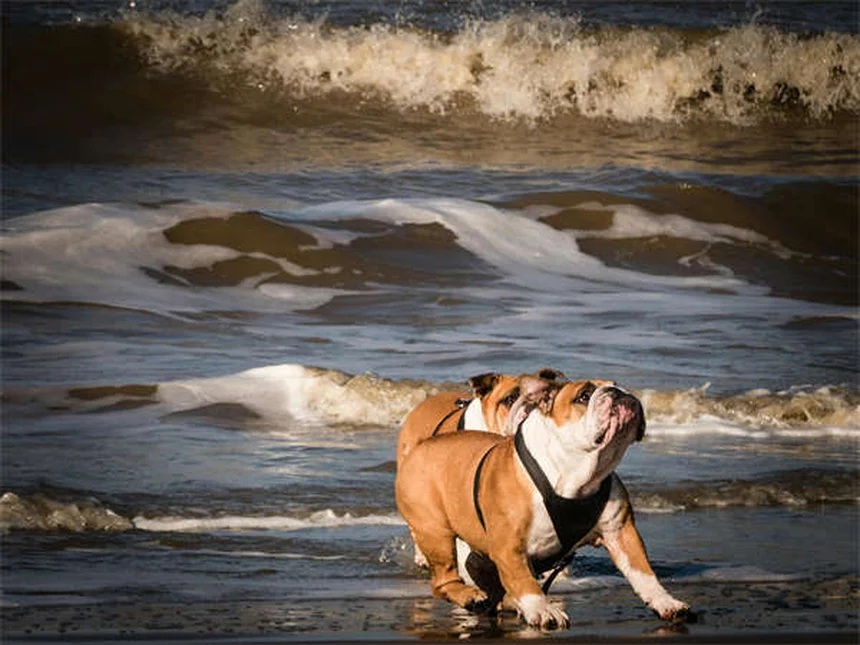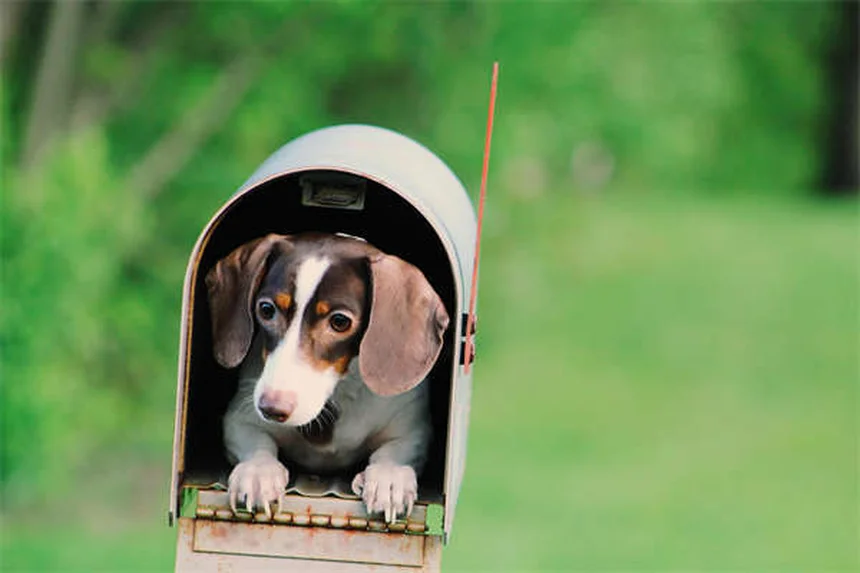Is your dog mad at you? The short answer is: no, your dog isn't capable of holding grudges like humans do. While it might feel like your pup is giving you the cold shoulder, dogs simply don't experience anger the way we do. That growl or side-eye you're getting? It's more likely fear, frustration, or even pain than actual anger.As a dog owner myself, I've been there - staring into those puppy eyes wondering what I did wrong. But here's the truth: your dog's mad behavior is probably trying to tell you something completely different. Maybe they're stressed about a routine change, or perhaps they're not feeling well. In this article, we'll break down what's really going on when your dog seems upset and how you can help them feel better.
E.g. :Why Is My Dog Not Social? Understanding Loner Dog Behavior
Advertisement
- 1、Understanding Your Dog's Emotions
- 2、Decoding "Mad Dog" Behavior
- 3、When to Worry About Your Dog's Behavior
- 4、Practical Solutions for a Happier Pup
- 5、Strengthening Your Bond With Your Dog
- 6、The Science Behind Canine Emotions
- 7、Beyond Basic Emotions: Complex Canine Feelings
- 8、Enhancing Emotional Connection With Your Dog
- 9、Future Frontiers in Canine Emotion Research
- 10、FAQs
Understanding Your Dog's Emotions
Dogs Experience Basic Emotions Just Like Us
Ever had that moment when your dog gives you "the look" and you immediately wonder, "Did I forget walk time?" Let me tell you, dogs absolutely feel emotions - and science backs this up! Joy, fear, anxiety, excitement - these are all part of your pup's emotional vocabulary.
Think of your dog's emotional intelligence like a toddler's. They experience the world in similar ways, just without the ability to say "I'm mad at you for eating my chicken nugget." Their emotional range caps around what a two-and-a-half-year-old human experiences. So when Fido seems upset, it's more likely he's feeling something immediate rather than plotting revenge for that bath you gave him last week.
What About Anger? The Truth Behind Growls and Barks
Here's the million-dollar question: Can dogs actually get angry at us? The answer might surprise you. While dogs definitely show behaviors we interpret as anger - growling, snapping, avoiding us - they don't have the cognitive ability to assign motives to their emotions like humans do.
That growl when you touch their favorite toy? More likely frustration than anger. The sudden bark when you come home late? Probably anxiety rather than resentment. Dogs live in the moment - they're not holding grudges from last Tuesday when you accidentally stepped on their tail.
Decoding "Mad Dog" Behavior
 Photos provided by pixabay
Photos provided by pixabay
Why Your Dog Might Seem Upset With You
Let's play detective with your dog's behavior. If Rover's giving you the cold shoulder, ask yourself:
- Has his routine changed recently?
- Is he getting less exercise than usual?
- Could he be in pain or discomfort?
Dogs are masters at hiding pain - it's an evolutionary survival tactic. That "angry" behavior might actually be your pup's way of saying, "Hey, my back hurts!" without actually limping or whining. Before assuming it's personal, consider physical causes first.
Common Triggers for "Angry" Behavior
Here's a quick comparison of what we think is anger versus what's really happening:
| What It Looks Like | What It Probably Is |
|---|---|
| Growling when approached | Fear or resource guarding |
| Avoiding eye contact | Stress or submission |
| Destructive behavior | Separation anxiety |
See the pattern? What we interpret as anger is usually something else entirely. And here's a fun fact: dogs don't have the facial muscles to give us true "angry" expressions like humans do. That scowl? Probably just them trying to understand why you're staring at them!
When to Worry About Your Dog's Behavior
Red Flags That Need Veterinary Attention
Now, let's talk serious business. Some behaviors absolutely warrant a vet visit:
If your dog stops eating, becomes unusually lethargic, or shows sudden personality changes, don't wait it out. These could signal anything from arthritis to more serious conditions. Remember, dogs can't tell us when something's wrong - we have to be their advocates.
Here's a pro tip: Keep a behavior journal for a few days before your vet visit. Note what's different, when it happens, and any environmental changes. This helps your vet pinpoint issues faster than you can say "Where's the treat jar?"
 Photos provided by pixabay
Photos provided by pixabay
Why Your Dog Might Seem Upset With You
Did you know that most "behavior problems" actually stem from anxiety? It's true! Changes in your routine, new people in the house, even rearranged furniture can stress out your pup. They thrive on predictability - when that gets disrupted, they might act out in ways we misinterpret as anger.
Think about it: If someone suddenly moved all your furniture while you were at work, wouldn't you be a little upset too? Now imagine you couldn't ask why it happened. That's your dog's reality when things change unexpectedly!
Practical Solutions for a Happier Pup
Creating a Dog-Friendly Environment
So what can you actually do to help your seemingly "mad" dog? Start with these simple steps:
- Maintain consistent routines for feeding, walks, and playtime
- Provide mental stimulation with puzzle toys
- Create safe spaces where your dog can retreat when overwhelmed
And here's a golden rule: Never punish growling. That's your dog's way of saying "I'm uncomfortable" - if you punish that communication, they might skip the warning next time and go straight to biting. Instead, try to understand and address what's causing the discomfort.
When to Call in the Professionals
Sometimes, despite our best efforts, we need backup. If behavior issues persist after ruling out medical causes and making environmental adjustments, consider these options:
A certified dog behavior consultant can work wonders. They're like doggy therapists, helping decode what's really going on in your pup's mind. And no, they won't make your dog lie on a tiny couch - though that would be adorable to see!
Remember, addressing behavior issues is a process. There's no magic "fix my dog" button (though wouldn't that be convenient?). But with patience and the right approach, you and your furry friend can get back to enjoying each other's company - no hard feelings involved!
Strengthening Your Bond With Your Dog
 Photos provided by pixabay
Photos provided by pixabay
Why Your Dog Might Seem Upset With You
Want to become a dog whisperer? Start by learning to read your dog's actual body language instead of projecting human emotions onto them. A wagging tail doesn't always mean happy, just like a growl doesn't always mean angry.
Here's a quick cheat sheet for common misread signals:
- Yawning: Often stress, not tiredness
- Lip licking: Usually anxiety, not hunger
- Whale eye (showing the whites of their eyes): Typically discomfort
See how easy it is to misinterpret? The more you understand what your dog is really saying, the stronger your bond will become. And isn't that what we all want - a happy, healthy relationship with our four-legged best friends?
Quality Time That Really Matters
Here's a radical idea: Maybe your dog isn't mad at you - maybe they just want more of your undivided attention! In our busy lives, it's easy to forget that our dogs crave meaningful interaction, not just quick potty breaks and rushed meals.
Try this experiment: For one week, dedicate 15 minutes of pure, distraction-free playtime with your dog each day. No phone, no TV, just you and your pup. You might be amazed at how much this simple change improves their overall demeanor. After all, isn't that what you'd want if you were in their paws?
The Science Behind Canine Emotions
How Dogs Process Emotions Differently Than Humans
You know that warm fuzzy feeling when your dog greets you at the door? Turns out, their brain actually releases the same "love hormone" - oxytocin - that we do during happy moments! But here's the kicker: dogs experience emotions in shorter bursts compared to humans.
While we might stew over an argument for days, your dog's emotional memory lasts about two minutes max. That's why they can go from "I hate this bath" to "Best day ever!" in the time it takes to shake water off their coat. Their emotional processing is more like flipping through TV channels than watching a full movie.
The Surprising Emotional Intelligence of Dogs
Ever notice how your dog seems to know when you're sad? Research shows dogs can actually recognize human facial expressions and respond accordingly. They're the only non-primate animals proven to do this!
Here's a fun experiment to try: Make exaggerated happy and sad faces at your dog (when no one's watching, of course). You'll likely see different responses - maybe tail wags for smiles and head tilts for frowns. Just don't be surprised if they start mimicking your expressions back at you!
Beyond Basic Emotions: Complex Canine Feelings
Can Dogs Feel Jealousy or Embarrassment?
Now we're getting into controversial territory! While science hasn't proven dogs experience complex emotions like guilt or pride, there's fascinating evidence about jealousy. In multiple studies, dogs reacted negatively when their owners petted fake dogs - some even tried to push the imposters away!
But here's where it gets really interesting: The table below shows how different breeds react to jealousy triggers:
| Breed Type | Common Jealousy Response | Typical Recovery Time |
|---|---|---|
| Retrievers | Push between owner and rival | 30 seconds |
| Terriers | Barking/protesting | 2-3 minutes |
| Herding Dogs | Attempt to control situation | 1-2 minutes |
See how personality plays a role? This suggests emotions in dogs might be more nuanced than we thought. But remember - they're still not holding grudges like humans do!
The Myth of the "Guilty Look"
That classic "I ate the couch" face? Turns out it's not guilt at all! Studies show dogs make that expression in response to owner disapproval, not because they feel bad about their actions. They're basically thinking, "Uh oh, human looks mad - better act submissive!"
Here's proof: In experiments where owners scolded dogs regardless of whether they'd misbehaved, the "guilty look" appeared just as often. This means your pup isn't connecting their past actions with your current reaction - they're just reacting to your tone and body language in the moment.
Enhancing Emotional Connection With Your Dog
Music Therapy for Dogs - Seriously!
Would you believe certain types of music can actually calm anxious dogs? Research shows classical music, especially pieces with 50-60 beats per minute (similar to a resting heart rate), can reduce stress behaviors in kenneled dogs by up to 70%!
Next time you leave the house, try leaving on some soft Mozart or Beethoven. Just avoid heavy metal - one study found it increased barking and restlessness. Though I have to wonder - has anyone tested polka music on dogs? That could either be hilarious or terrifying to watch!
The Power of Scent in Emotional Bonding
Here's something wild: Your dog's sense of smell is so powerful, they can actually detect chemical changes in your body odor that indicate different emotional states. That's right - they can smell when you're happy, stressed, or even sick!
You can use this to strengthen your bond. Try this: Sleep with a small towel for a few nights, then give it to your dog when you leave. Your familiar scent provides comfort and reduces separation anxiety. Just maybe don't use your favorite towel - we all know how dogs like to rearrange their bedding!
Future Frontiers in Canine Emotion Research
Could Dogs Help Detect Human Mental Health Issues?
This might blow your mind: Some service dogs are now being trained to recognize and interrupt panic attacks before they happen. How? They pick up on subtle physical changes we can't even perceive ourselves!
Imagine having a furry early warning system for anxiety or PTSD episodes. The potential here is enormous - we're talking about dogs potentially saving lives by recognizing emotional crises humans can't even identify yet. Makes you wonder - what other emotional superpowers might our dogs have that we haven't discovered?
The Coming Revolution in Dog-Human Communication
Get ready for this: Scientists are developing technology that could translate dog barks and body language into human speech! Early prototypes already distinguish between "playful," "alert," and "distress" barks with about 90% accuracy.
While we're still years away from a true "dog translator" device, the implications are staggering. Imagine knowing exactly what your dog is trying to tell you! Though part of me worries - do we really want to know what they're thinking when we leave them home alone with the garbage can?
E.g. :Can Your Dog Forgive You? Expert Reveals 6 Signs Your Pet Is Mad
FAQs
Q: Can dogs actually get angry at their owners?
A: While dogs definitely show behaviors we might interpret as anger, they don't experience anger in the same complex way humans do. Your dog isn't sitting there thinking, "I'm so mad at you for being late to dinner!" Their emotional range is more immediate and simple - think more like a toddler than an adult human. What looks like anger is usually fear, frustration, anxiety, or even excitement. The key is to look beyond the surface behavior to understand what your dog is really trying to communicate.
Q: Why does my dog avoid me sometimes?
A: If your dog is giving you the cold shoulder, don't take it personally! There are many possible reasons that have nothing to do with being mad at you. Your pup might be feeling under the weather, stressed about a recent change, or simply needing some alone time. Dogs, like people, sometimes need space. It could also be that they associate you with something unpleasant (like bath time) and are trying to avoid that experience. The best approach is to give them space while monitoring for other signs of distress.
Q: How can I tell if my dog is actually upset with me?
A: Here's the thing - your dog isn't capable of being "upset with you" in the human sense. Instead, look for signs of stress or discomfort: pinned-back ears, tucked tail, avoiding eye contact, or excessive yawning. These are all signals that your dog isn't comfortable with the current situation. Rather than assuming they're mad at you, try to identify what might be causing their stress. Did you recently change their routine? Is there a new person or pet in the house? Solving the root cause will help more than worrying about their feelings toward you.
Q: What should I do when my dog growls at me?
A: First, don't punish the growl - it's your dog's way of saying "I'm uncomfortable." Instead, stop whatever you're doing that triggered the growl and assess the situation. Was your dog eating? Sleeping? Being approached too quickly? Give them space and try to identify the trigger. If growling becomes frequent, consult with a professional trainer or behaviorist. Remember, growling is communication, not "bad behavior" - your dog is trying to tell you something important about their comfort level.
Q: How can I improve my relationship with my dog?
A: The best way to strengthen your bond is through positive, consistent interactions. Make sure your dog's basic needs are met - proper exercise, mental stimulation, and a predictable routine go a long way. Spend quality time together doing activities your dog enjoys, whether that's playing fetch, going for walks, or just relaxing together. Most importantly, learn to read your dog's body language so you can respond to their needs before they feel the need to "act out." A happy dog is one who feels understood and secure in their environment.

